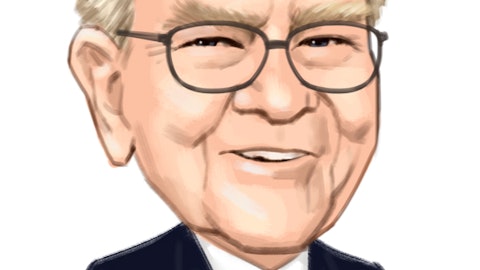The tariff battle between China and U.S. has become more than just talk. After President Trump raised tariffs on hundreds of billions of dollars worth of imports from China, Trump has now targeted Huawei adding it to a trade blacklist. Huawei is a big company with around $100 billion in revenue last year. The intelligence community has complained about security risks concerning the company’s equipment before, and many pundits support the decision. Due to the move, the tech world is now on edge as there seems to be the beginning of a cold war between the two countries (at least until a potential settlement), one where the internet and tech is split into two parts one with America in the center and one with China in the center. Let’s take a look at how the tech cold war affects big companies such as Alphabet Inc (NASDAQ:GOOG), Microsoft Corporation (NASDAQ:MSFT), Amazon.com, Inc. (NASDAQ:AMZN), Alibaba Group Holding Limited (NYSE:BABA), Baidu.com, Inc. (NASDAQ:BIDU).
Our research has shown that hedge funds’ small-cap stock picks managed to beat the market by double digits annually between 1999 and 2016, but the margin of outperformance has been declining in recent years. Nevertheless, we were still able to identify in advance a select group of hedge fund holdings that outperformed the market by 38 percentage points since May 2014 through May 15, 2019. Our best performing hedge funds strategy also returned 26.4% year-to-date and outperformed the S&P 500 Index by nearly 12 percentage points (see the details here). We were also able to identify in advance a select group of hedge fund holdings that underperformed the market by 10 percentage points annually between 2006 and 2017. Interestingly the margin of underperformance of these stocks has been increasing in recent years. Investors who are long the market and short these stocks would have returned more than 27% annually between 2015 and 2017. We have been tracking and sharing the list of these stocks since February 2017 in our quarterly newsletter.

Alphabet Inc (NASDAQ:GOOG) shares are down by around 2% versus the NASDAQ’s around 1.7% retreat after the company suspended business with Huawei, which is the world’s second largest smartphone maker. Huawei has been a user of Google’s Android, which is the world’s most popular mobile operating software. Instead, Huawei will now have to use Android Open Source Project, and its users will have to make do without some of Google’s most popular apps. Alphabet shares aren’t down as much as Qualcomm because the company doesn’t have as much business in the country as the chip maker.
Speaking of tech giants, Microsoft Corporation (NASDAQ:MSFT) and Amazon.com, Inc. (NASDAQ:AMZN) are down by 1.44% and 0.54% on the same Huawei news. The Seattle headquartered companies are less affected than Alphabet because Amazon.com doesn’t really have much of a tech presence in China. Although it has substantial market share in desktop and business applications, Microsoft doesn’t have much of a smartphone presence either. Microsoft’s relationship with Huawei is certainly less important than Alphabet’s relationship with the company. Given the price action of Microsoft shares, it seems traders don’t think the U.S. government will ban Windows operating system exports to China.
Of the around 700-740 elite funds we track, 141 funds owned $12.83 billion of Alphabet Inc (NASDAQ:GOOG), 174 elite funds owned shares of Microsoft Corporation (NASDAQ:MSFT), and 168 elite funds owned shares of Amazon.com, Inc. (NASDAQ:AMZN) at the end of December.
Although they aren’t directly affected by the Trump blacklist, Alibaba Group Holding Limited (NYSE:BABA) and search company Baidu.com, Inc. (NASDAQ:BIDU) are down 5% and 8% on the same Huawei news. If the U.S. trade war with China gets worse, the Chinese economy could slow a lot further than current estimates and the two companies will have a hard time meeting Wall Street earnings estimates. If the trade war gets worse, China could also let its currency fall and the two companies’ earnings won’t be as much in dollar terms.
The number of elite funds with holdings in Alibaba Group Holding Limited (NYSE:BABA) fell by 14 quarter-over-quarter to 113 at the end of December. 51 elite funds had a bullish position in Baidu.com, Inc. (NASDAQ:BIDU) at the end of December.
Disclosure: None. This article was originally published at Insider Monkey.




